The Shanghai Jiao Tong University (SJTU) School of Nursing recently undertook itsfirst overseas academic visit as part of its inaugural five-year talent development plan, sending an exchange mission to the National University of Singapore (NUS) from November 13 to 17. This marks another milestone for the School, as it underscores its commitment to global engagement and academic excellence.
Under Executive Dean ZHANG Xin and Associate Dean ZHU Bingqian, a handpicked delegation of six nursing academics and practitioners from the School of Nursing, the affiliated Ruijin Hospital, the affiliated Renji Hospital and the affiliated Shanghai Children's Medical Center was assembled for the visit to Singapore. During the visit, as per the scheduled itinerary, meetings were held with various NUS officials, including Prof. Chong Yap Seng, Dean of the Yong Loo Lin School of Medicine, Prof. Alfred Kow, Assistant Dean (Education) of the Yong Loo Lin School of Medicine, and Assoc. Prof. Koh Dow Rhoon, Director of International Relations. The delegates also met withProf. Liaw Sok Ying, Head of the Alice Lee Centre for Nursing Studies (ALCNS), Dr. Emily Ang, Honorary Advisor, Assoc. Prof. Zhou Wentao, Director of Education for Continuing Education and Training, Assoc. Prof. Wilson Tam, Director of Research, Assoc. Prof. Lydia Lau, Director of Teaching, Dr. Rosalind Siah, Undergraduate Programmes Director for Clinical Education, Ms. Chan Yah Shih, Programme Director for Bachelor of Science (Nursing Practice), Assoc. Prof. Shefaly Shorey, Joint Chair of Women and Child Health Care Programme, Asst. Prof. Vivien Wu, Chair of Geriatric Care and Wellness Programme, Asst. Prof. Shawn Goh, Researcher of Mental Health Programme, Asst. Prof. Jiang Ying, Researcher of Chronic Illness and Long-term Care Programme, and other NUS officials,faculties, and researchers.
The delegation engaged in a series of collaborative events with the ALCNS, including the China-Singapore Nursing Research Cooperation Symposium, China-Singapore Health System and Nursing Education Sharing Session, and aChina-Singapore Education Collaboration Meeting. These meetings provided a comprehensive understanding of nursing in Singapore and the overall landscape of theALCNS. There are currently 43,772 registered nurses in Singapore, with a nurse-to-population ratio of 1:129. Each year, approximately 2,000 new graduates enter the nursing profession. In terms of education, the Centre primarily offers undergraduate, postgraduate and continuing education and training programs.ALCNS places great emphasis on developing students' practical skills and interdisciplinary teamwork. Undergraduate clinical practice runs in parallel with theoretical learning throughout the four years of study. Specialized interdisciplinary courses that involve collaboration between nursing, medical, pharmacy and dental students are developed to cultivate students'teamwork skills across disciplines. In terms of research,the ALCNS excels in the following five programs: Chronic Illness and Long-term Care, Education Innovation, Geriatric Care and Wellness, Patient Safety and Quality Care, and Women andChildren Health Care. Research group leaders from both sides presented the directions, achievements, and next steps of their research projects.Fruitful discussions were held on their respective research areas and potential opportunities for future collaboration.
In addition, the delegation visited the NUS campus, the affiliated Alexandra Hospital and the nursing practice center to gain a comprehensive picture of this internationally renowned institution. The NUS stands as a university with a distinctive educational philosophy, state-of-the-art facilities and an excellent academic environment. The campus boasts a beautiful environment with unique architectural styles that exude a sense of modernity and technology.The delegatesvisited the University Town (UTown), NUS'slatest educational hub, which offers a wide range of facilities and resources for students' academic and personal development. At Alexandra Hospital, the hospital shared its successful Health and Care model, which places patients under one the following five clinical programmes: Be Better (Preventive Care), Get Better (Acute Care), Live Better (Chronic Care), Age Better (Healthy Ageing) and Cope Better (Supportive and Palliative Care). This model provides holistic and seamless care from acute, sub-acute to rehabilitative settings, reducing the need for a patient to transfer to another healthcare institution.The delegationalsotoured the hospital's smart wards and geriatric wards and engaged in extensive discussions about the use, patient feedback, and future prospects of smart wards in both countries. At the nursing practice center, Dr. Rosalind Siah shared a research project conducted by the NUS during COVID-19. This project used innovative immersive virtual reality applications to support students' independent learning at home. The results showed that students who received immersive virtual reality education did not experience a decline in learning outcomes.
During the visit, SJTU delegates held active discussions with NUS Nursing, providing an overview of nursing in China, as well as theSJTUSchool of Nursing's enrollment, faculty, education and teaching, scientific research, international exchanges, and development plans for advancing the nursing discipline.The delegates also shared their individual research interests and collaboration plans, effectivelydemonstrating SJTU’s research strength and their willingness for international cooperation. This visit has been an effective breakthrough in the School's talent development efforts. It stands as a solid initiative in advancing the nursing discipline and serves as a key step in broadening the global perspective of nursing academics.
Based on the consensus reached during the visit, the NUS Alice Lee Centre for Nursing Studies and the SJTU School of Nursing will strengthen exchanges and cooperation in areas such as linked undergraduate and postgraduate education, student exchanges, joint research projects and applications. Both institutions expect to join hands in advancing nursing education and research, thereby continuouslystrengthening ties within the global nursing community.
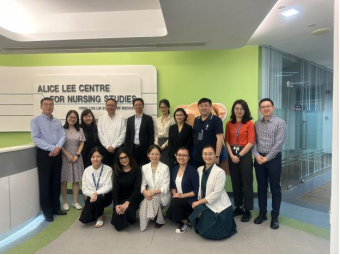

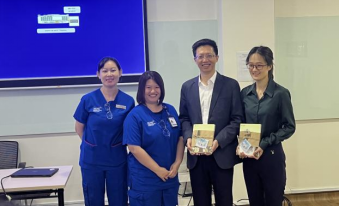
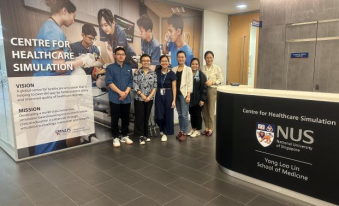
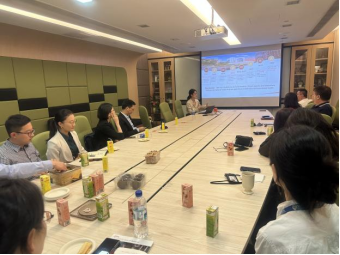
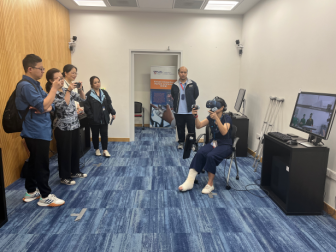
Source: School of Nursing





